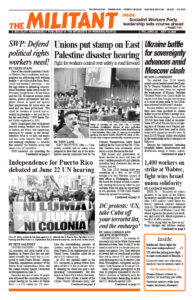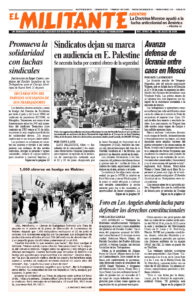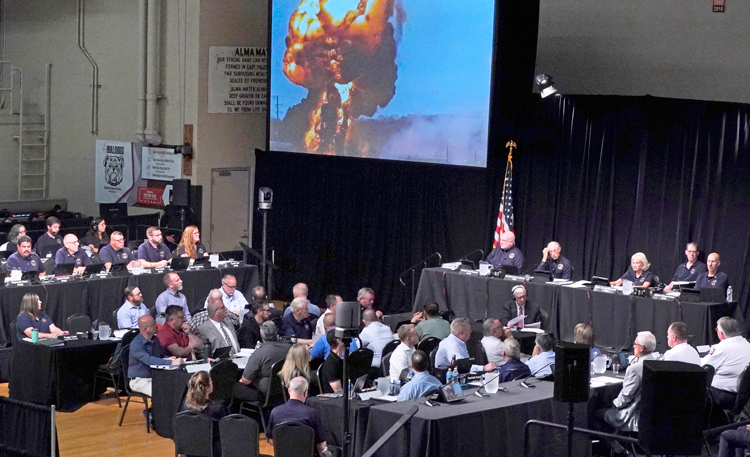EAST PALESTINE, Ohio — Community residents and rail unions came prepared to have their say at the investigative hearing organized here by the National Transportation Safety Board looking for the causes of the Feb. 3 Norfolk Southern train derailment, which led to a social disaster in the area.
Rail bosses and government officials decided to drain and burn off over 1 million pounds of vinyl chloride, spreading toxic chemicals into the air, streams and soil.
The June 22-23 hearing itself was something of a first, as the NTSB brought it to East Palestine, instead of their offices in Washington, D.C. And the board felt obliged to hold a community meeting the evening before to give residents from the area an opportunity to ask questions. NTSB Chair Jennifer Homendy opened the meeting.
The first speaker, whose name was picked at random, was David Ferguson, a member of the Bakery, Confectionery, Tobacco Workers and Grain Millers union and the Socialist Workers Party. “To prevent the next disaster, we need a power shift from corporations like Norfolk Southern, whose only concern is making more profit, to the workers, who are actually running and maintaining the railroads, and their unions,” Ferguson said. “The workers have an interest in safety for themselves and the communities along the way. We can have no faith in the government after they ordered rail workers to return to work last year under a contract that they had just voted down.”
“I was describing how workers need to take control over safety and conditions on the job,” Ferguson told the Militant. “I have personal experience with this as a former member of the United Mine Workers. For a time the union won the ability to stop production to deal with safety issues.”
Daniel Banks, a staff member for the Sheet Metal, Air, Rail and Transportation Workers — Transportation Division (SMART-TD), the railroad conductors union, who was in the audience, told the Militant that when he heard what Ferguson said, “I wanted to carry him out of the room on my shoulders!”
The board tried to limit what people could ask about. Nonetheless, the NTSB chair was peppered with questions. Zsuzsa Gyenes asked, “Who empowers the recommendations?” Another participant said, “The regulations in place didn’t help,” and asked, “Will future regulations help?” Chrissy Reid asked, “Who sets the speed limits for trains going through the town?” Jami Wallace, a member of the Unity Council for the East Palestine Train Derailment, told Homendy, “It’s taken us months to get information. Can we submit it to you?”
Misti Allison asked, “Was the vinyl chloride release warranted?” Another participant asked, “What happened to the 911 call that there was a train on fire?” Russ Murphy asked, “Are the standards for ‘critical alerts’ too high?” referring to the trackside detectors railroads use to identify fires and overheating on train wheels.
Union members at the hearing
When the actual board hearing began the next morning, it was marked by the participation of the rail unions.
Four rail unions are parties to the investigation — the Brotherhood of Locomotive Engineers and Trainmen, SMART-TD, the Brotherhood of Railroad Signalmen and the Transportation Communications Union/IAM, which represents carmen. This meant they could ask questions of the witnesses. Two rail unions members testified at one of the four panels at the hearing.
Lisa Mahoney, a private school teacher, told the Militant, “What scares me is what they aren’t telling us, what we don’t know. It’s so good to see the union people up there telling the truth about Norfolk Southern. I’m very grateful.”
Randy Fannon, a Brotherhood of Locomotive Engineers and Trainmen vice president and national chairman of the union’s safety task force, told the Militant, “We need to enhance the safety of our members and what affects them affects the communities along the tracks — 100%. That’s why labor needs to be involved in what happens here in East Palestine.
“The impact on rail safety of today’s longer trains is something I brought up in the hearings here,” he said.
Fannon also explained what “Precision Scheduled Railroading” means for rail workers. During the hearing, witnesses for the rail bosses — from the Association of American Railroads and Norfolk Southern — claimed PSR just “means to be more efficient.”
“When they adopted PSR, the Class 1 railroads furloughed thousands of employees. They saved a lot of money,” Fannon said. “But with the employees left they had to do the same amount of work. Nothing changed in the amount of freight moved, but workers had to work more hours. That created fatigue.
“When workers ask for days off, days they are entitled to, the answer is, ‘no.’ They didn’t care that your son is graduating from high school that day. Of course, many workers take off anyway, and then get marked for attendance discipline. Many workers have quit.”
Chris Hand, director of research for the Brotherhood of Railroad Signalmen, spoke on the panel on “Wheel Bearings and Wayside Defect Detectors.” He described how rail company policies restrict workers’ ability to make the railroads safer for both rail labor and the surrounding communities. The safety value of wayside detectors is undermined, he said, because Norfolk Southern “is responsible for determining the testing protocols and schedules. … To prevent accidents like what occurred on Feb. 3, it is crucial to create regulations that establish standardized practices instead of relying solely on railroads to create their own standards.”
Jason Cox, national representative of the Transportation Communications Union Carmen’s Division, highlighted how the time allowed for union workers to conduct train inspections has been slashed. He said it used to be three minutes or more per car, but now they’re expected to take only 30 seconds a side to inspect a car. “Give them the time to do the work,” he argued.
Workers control over job conditions
Other panels in the hearing covered hazard communications and the initial emergency response, the decision to vent and burn the five vinyl chloride cars, and rail tank car safety. While the hearing focused more on technology, the union participation brought to the hearing the importance of the human factor, and that technology had to be in the hands of rail workers. Union statements and questions also highlighted the impact that rail bosses’ decisions have on rail workers and the safety of the railroads, including cuts in staff and consequent speedup and the impact of on-call work schedules on train crews.
Another way the bosses have tried to boost profits at the expense of safety is building longer and longer — and heavier and heavier — trains. The challenge this presents for operating crews working on these trains today was brought home in an interview with the engineer of the train that derailed in East Palestine. It was contained in a big dossier for the hearing.
That engineer explained how he handled the 151-car, 9,300-foot-long train, weighing 18,000 tons: “I took over [from the computer running the train] because I just didn’t trust it with the weight and the tonnage, and I was actually running it, not the computer. … It was just my way of trying to be safe.” There was also “a train in front of me, a heavy train, I don’t know how heavy, but I know it’s big.”
Jared Cassity of SMART asked the two union witnesses at the hearing, “What could be done today to improve rail safety?” Both Cox and Hand stressed the devastating impact of the cuts on the workforce. Hand said, “They’re putting more work on individuals than is needed.” Cox explained technology is only good when workers are allowed to wield it. “The firewall of safety has been severely compromised.”
All this brings home the reality of what workers and the unions need to do under the for-profit system of capitalism — fight for workers control over all aspects of production and transportation.



